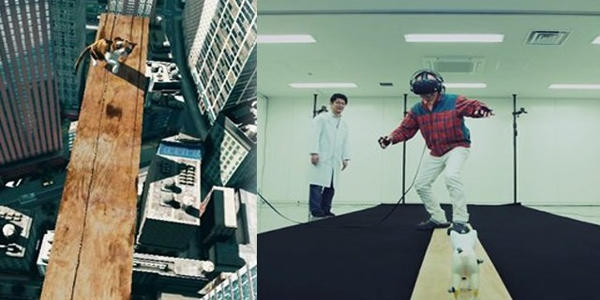Researchers from the University of Basel have created a virtual reality app for smartphones to help people overcome their fear of heights. They have now conducted a clinical trial to investigate its efficacy. Trial participants who spent four hours at home practicing with the app showed an improvement in their ability to handle real-life height situations.
Fear of heights is a common occurrence. In height situations, approximately 5% of the general population suffers from incapacitating discomfort. However, people who are affected rarely use available treatment options, such as exposure therapy, which involves placing the person in the anxiety-inducing situation under the supervision of a professional. On the one hand, people are apprehensive about confronting their fear of heights. On the other hand, recreating the appropriate types of height situations in a therapy setting can be difficult.
Researchers have developed a virtual reality app for smartphones to reduce the fear of heights. Now, they have conducted a clinical trial to study its efficacy. Trial participants who spent a total of four hours training with the app at home showed an improvement in their ability to handle real height situations.
Many people around the world are terrified of heights. In general, there are two types of people: those who are afraid of heights and those who are physically incapable of handling high places (i.e. acrophobia). Virtual reality can serve as a do-it-yourself therapist, assisting people in overcoming their fear of heights without the assistance of a professional.
This prompted an interdisciplinary research team led by Professor Dominique de Quervain to create Easyheights, a smartphone-based virtual reality exposure therapy app. The app makes use of 360° images of real-world locations captured by the researchers using a drone. People can use the app on their smartphones in conjunction with a virtual reality headset.

Gradually increasing the height
During the virtual experience, the user stands on a platform one meter above the ground at first. The platform rises automatically after a certain period of acclimatization to the situation. As a result, the perceived distance above the ground increases slowly but steadily without causing the person’s level of fear to rise.
In a randomized, controlled trial, the research team investigated the efficacy of this approach and published the findings in the journal NPJ Digital Medicine. Fifty trial participants with a fear of heights either completed a four-hour virtual reality height training program (one 60-minute session and six 30-minute sessions spread over two weeks) or were assigned to the control group, which did not complete these training sessions.
The trial participants ascended the Uetliberg lookout tower near Zurich as far as their fear of heights allowed them before and after the training phase – or for the same amount of time without training. The researchers recorded the participants’ height as well as their subjective fear level at each level of the tower. The researchers evaluated the results of 22 subjects who completed the Easyheights training and 25 from the control group at the end of the trial.
The group that completed the app-based training exhibited less fear on the tower and was able to ascend further towards the top than the group that did not complete the training. There were no positive changes in the control group. The Easyheights training proved to be as effective as traditional exposure therapy.
Therapy in your own living room
For more than two decades, researchers have been researching the use of virtual reality to treat fear of heights. “What is new is that smartphones can now be used to create virtual scenarios that previously required a technically complicated type of treatment, making it much more accessible,” explains Dr. Dorothée Bentz, the study’s lead author.
The study’s findings suggest that using a smartphone-based virtual reality exposure therapy on a regular basis can significantly improve behavior and subjective well-being in high-risk situations. People with a mild fear of heights will be able to download the free app from major app stores and complete training sessions on their own in the near future. However, the researchers advise that people who have a severe fear of heights use the app only under the supervision of a professional.
The current study is one of several projects currently underway at the Transfaculty Research Platform for Molecular and Cognitive Neurosciences, which is led by Professors Andreas Papassotiropoulos and Dominique de Quervain. Their goal is to use new technologies to improve the treatment of mental disorders and make these treatments more widely available.













